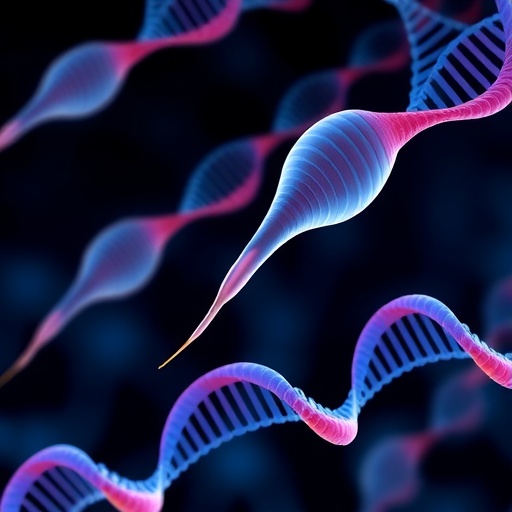Recent advances in genetic research have opened new frontiers in understanding male reproductive health. A groundbreaking study led by Khan et al. has identified potential genetic biomarkers for sperm dysfunction using whole-genome sequencing, which may revolutionize how we diagnose and treat infertility in men. This pivotal research underscores the complexity of sperm regulation at the genetic level, providing insights that could benefit countless couples struggling with conception.
Infertility has long been attributed to a variety of factors, including environmental influences and lifestyle choices. However, the genetic underpinnings of male infertility have not been fully explored until now. Khan and his team set out to discover hereditary components that may be responsible for sperm dysfunction. By leveraging cutting-edge whole-genome sequencing technologies, they analyzed the genomes of a diverse population of male subjects, revealing a multitude of genetic variations linked to reduced sperm quality and quantity.
The methodology employed in this groundbreaking study represents a significant technological leap forward. Whole-genome sequencing allows researchers to decode the entire genome, a process that reveals not just the presence of genes but also their intricacies—such as variations that may interfere with normal sperm development. This comprehensive approach contrasts with traditional methods that often focus on selective genes or small regions of the genome, potentially missing critical insights into the underlying genetic factors affecting male fertility.
The study meticulously examined various genetic markers that displayed a correlation with sperm count, motility, and morphology. These genetic anomalies can serve as biomarkers, providing essential clues to diagnose sperm dysfunction early. Indeed, understanding these genetic factors can lead to targeted interventions tailored to individual patients, moving away from the conventional one-size-fits-all approach that has dominated reproductive medicine.
Khan et al. further elaborated on the potential implications of their findings. The existence of specific genetic variants linked with sperm dysfunction signifies a need for genetic screening in men facing infertility challenges. This could not only streamline the diagnostic process but also pave the way for new therapeutic strategies aimed at rectifying underlying genetic defects. Such innovations could ultimately enhance assistive reproductive technologies, making them more effective and accessible.
Moreover, the implications of this research extend beyond individual cases of infertility. The insights gained from identifying these biomarkers can contribute to broader discussions about reproductive health on a global scale. Issues like declining sperm counts observed in many populations could be reevaluated through the lens of genetics, offering new pathways for public health initiatives focused on male reproductive wellness.
The research team also emphasized the significance of variant penetrance in the context of sperm dysfunction. They identified that not all genetic variations are equal; some exhibit strong correlations with impaired fertility, while others may have minimal or negligible effects. Investigating these differences enhances our understanding of how multifactorial sperm disorders can manifest, providing a nuanced perspective that could optimize future research directions.
As the study gains traction, it raises pertinent questions regarding ethical considerations in genetic testing for infertility. The prospect of widespread genetic screening presents both exciting possibilities and challenges. While the aim is to empower individuals with knowledge about their reproductive health, it inevitably introduces concerns regarding privacy, discrimination, and the societal implications of genetic information.
Funding or collaboration opportunities have also been highlighted in conjunction with the study, as genetic research continues to evolve rapidly. Khan and his colleagues indicated that partnerships between academic institutions and private biotech firms could foster innovative approaches to infertility treatment. By uniting expertise in genetics, medicine, and technology, the prospect of developing new therapies derived from genetic findings could translate into tangible benefits for patients.
In addition to these revelations, the research team conducted a thorough analysis of environmental and lifestyle factors alongside genetic data. This comprehensive approach further contextualized the findings and demonstrated how genetic predispositions could be influenced or exacerbated by external elements. A better understanding of these interactions may provide holistic solutions for addressing sperm dysfunction beyond genetic fixes alone.
In conclusion, Khan and his colleagues have laid foundational work in identifying genetic biomarkers for sperm dysfunction through the use of whole-genome sequencing. By unraveling the complex tapestry of genetic variations linked to male infertility, this study marks a significant milestone in reproductive genetics. As we look toward the future, the hope is that this research will inspire continued efforts to better understand male reproductive health, empowering men and couples to navigate their fertility journeys with greater knowledge and resources.
The road ahead will likely feature ongoing collaborations across multiple disciplines to advance the field of reproductive genetics. Khan et al.’s work will undoubtedly ignite further research initiatives aimed at exploring the genetic landscape affecting male fertility, potentially leading to breakthroughs that could benefit generations to come. As science continues to unveil the mysteries of genetics, the insights gleaned from this study will play a crucial role in shaping the future of reproductive health.
Ultimately, the hope is that the findings from this study will bridge the gap between genetics and clinical practice, ensuring that the next generation of therapies in reproductive medicine are as individualized and effective as the patients they serve. As the dialogue around fertility and genetics evolves, Khan et al.’s research will undoubtedly remain at the forefront, inspiring a new wave of scientific inquiry and innovation in the search for solutions to male infertility.
Subject of Research: Genetic biomarkers for sperm dysfunction through whole-genome sequencing
Article Title: Identifying potential genetic biomarkers for sperm dysfunction through whole-genome sequencing
Article References:
Khan, M.R., Shah, A.A., Al Smadi, M.A. et al. Identifying potential genetic biomarkers for sperm dysfunction through whole-genome sequencing. Sci Rep 15, 36476 (2025). https://doi.org/10.1038/s41598-025-23897-w
Image Credits: AI Generated
DOI: 10.1038/s41598-025-23897-w
Keywords: Genetic biomarkers, sperm dysfunction, whole-genome sequencing, male infertility, reproductive health.




